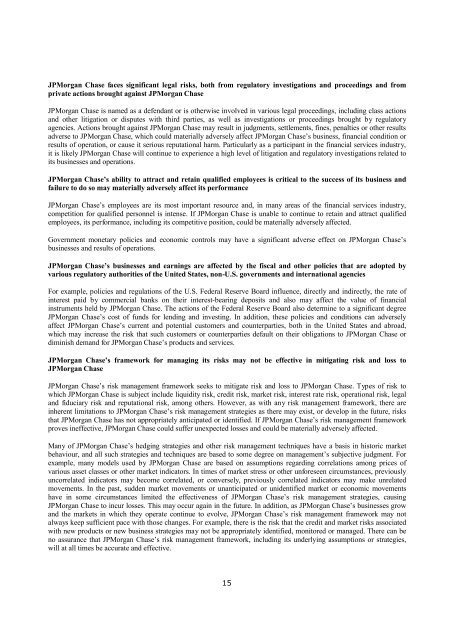JPMORGAN CHASE & CO. - Irish Stock Exchange
JPMORGAN CHASE & CO. - Irish Stock Exchange
JPMORGAN CHASE & CO. - Irish Stock Exchange
You also want an ePaper? Increase the reach of your titles
YUMPU automatically turns print PDFs into web optimized ePapers that Google loves.
JPMorgan Chase faces significant legal risks, both from regulatory investigations and proceedings and from<br />
private actions brought against JPMorgan Chase<br />
JPMorgan Chase is named as a defendant or is otherwise involved in various legal proceedings, including class actions<br />
and other litigation or disputes with third parties, as well as investigations or proceedings brought by regulatory<br />
agencies. Actions brought against JPMorgan Chase may result in judgments, settlements, fines, penalties or other results<br />
adverse to JPMorgan Chase, which could materially adversely affect JPMorgan Chase’s business, financial condition or<br />
results of operation, or cause it serious reputational harm. Particularly as a participant in the financial services industry,<br />
it is likely JPMorgan Chase will continue to experience a high level of litigation and regulatory investigations related to<br />
its businesses and operations.<br />
JPMorgan Chase’s ability to attract and retain qualified employees is critical to the success of its business and<br />
failure to do so may materially adversely affect its performance<br />
JPMorgan Chase’s employees are its most important resource and, in many areas of the financial services industry,<br />
competition for qualified personnel is intense. If JPMorgan Chase is unable to continue to retain and attract qualified<br />
employees, its performance, including its competitive position, could be materially adversely affected.<br />
Government monetary policies and economic controls may have a significant adverse effect on JPMorgan Chase’s<br />
businesses and results of operations.<br />
JPMorgan Chase’s businesses and earnings are affected by the fiscal and other policies that are adopted by<br />
various regulatory authorities of the United States, non-U.S. governments and international agencies<br />
For example, policies and regulations of the U.S. Federal Reserve Board influence, directly and indirectly, the rate of<br />
interest paid by commercial banks on their interest-bearing deposits and also may affect the value of financial<br />
instruments held by JPMorgan Chase. The actions of the Federal Reserve Board also determine to a significant degree<br />
JPMorgan Chase’s cost of funds for lending and investing. In addition, these policies and conditions can adversely<br />
affect JPMorgan Chase’s current and potential customers and counterparties, both in the United States and abroad,<br />
which may increase the risk that such customers or counterparties default on their obligations to JPMorgan Chase or<br />
diminish demand for JPMorgan Chase’s products and services.<br />
JPMorgan Chase’s framework for managing its risks may not be effective in mitigating risk and loss to<br />
JPMorgan Chase<br />
JPMorgan Chase’s risk management framework seeks to mitigate risk and loss to JPMorgan Chase. Types of risk to<br />
which JPMorgan Chase is subject include liquidity risk, credit risk, market risk, interest rate risk, operational risk, legal<br />
and fiduciary risk and reputational risk, among others. However, as with any risk management framework, there are<br />
inherent limitations to JPMorgan Chase’s risk management strategies as there may exist, or develop in the future, risks<br />
that JPMorgan Chase has not appropriately anticipated or identified. If JPMorgan Chase’s risk management framework<br />
proves ineffective, JPMorgan Chase could suffer unexpected losses and could be materially adversely affected.<br />
Many of JPMorgan Chase’s hedging strategies and other risk management techniques have a basis in historic market<br />
behaviour, and all such strategies and techniques are based to some degree on management’s subjective judgment. For<br />
example, many models used by JPMorgan Chase are based on assumptions regarding correlations among prices of<br />
various asset classes or other market indicators. In times of market stress or other unforeseen circumstances, previously<br />
uncorrelated indicators may become correlated, or conversely, previously correlated indicators may make unrelated<br />
movements. In the past, sudden market movements or unanticipated or unidentified market or economic movements<br />
have in some circumstances limited the effectiveness of JPMorgan Chase’s risk management strategies, causing<br />
JPMorgan Chase to incur losses. This may occur again in the future. In addition, as JPMorgan Chase’s businesses grow<br />
and the markets in which they operate continue to evolve, JPMorgan Chase’s risk management framework may not<br />
always keep sufficient pace with those changes. For example, there is the risk that the credit and market risks associated<br />
with new products or new business strategies may not be appropriately identified, monitored or managed. There can be<br />
no assurance that JPMorgan Chase’s risk management framework, including its underlying assumptions or strategies,<br />
will at all times be accurate and effective.<br />
15
















